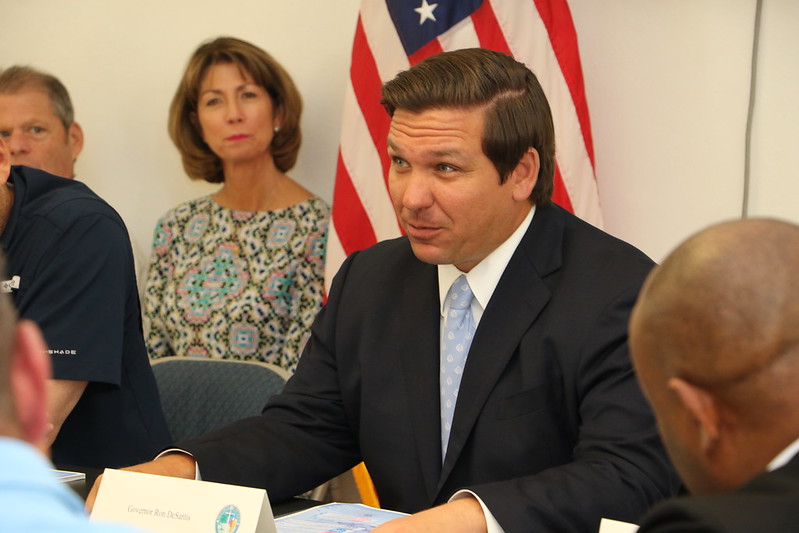
Florida’s governor, Ron DeSantis, has taken to the pages of The Wall Street Journal’s editorial section to explain why he fought back against Disney’s corporate activism by stripping the company of its special treatment under the law. He writes:
On Monday, I signed the law ending the Walt Disney Co.’s self-governing status over 43 square miles in central Florida, an area almost as big as Miami. Disney no longer has its own government. It has to live under the same laws as Universal Studios, SeaWorld and every other company in our state and is still on the hook for the old district’s municipal debt.
Disney’s special arrangement, which dates to 1967, was an indefensible example of corporate welfare. It provided the company with favorable tax treatment, including the ability to assess its own property valuations and to enjoy the benefits of regional infrastructure improvements without paying taxes toward the projects. It exempted Disney from Florida’s building and fire-prevention codes. It even allowed Disney to build a nuclear power plant and to use eminent domain to seize private property outside the district’s boundaries. While special districts are common in Florida, Disney’s deal was conspicuous in the massive benefits it conferred. Disney’s self-governing status endured because the company’s unrivaled political power in Florida made its arrangement virtually untouchable.
For more than 50 years, the state of Florida put Disney on a pedestal. That all changed last year, when left-wing activists working at the company’s headquarters in Burbank, Calif., pressured Disney to oppose Florida’s Parental Rights in Education Act. The legislation bans classroom instruction on sexuality and gender ideology in kindergarten through third grade and requires that sex instruction in other grades be age-appropriate. Disney executives were seen on videos boasting about the company’s plans to inject sexuality into its programming for children.
Democrats often rail about corporations’ nefarious influence over politics and oppose favorable exceptions for big companies. Yet they supported keeping Disney’s special self-governing status. This confirms how much the modern left has jettisoned principle in favor of power. As long as large corporations help advance the left’s woke agenda, the left is willing to do their bidding.
The question many people asked me after the Disney face-off was: Why would a company like Disney tarnish its family-friendly brand, built up over almost 100 years, by publicly aligning itself with the fringe left’s agenda to limit the rights of parents to have a say in what is taught to very young children? The answer lies in how the left has pressured big companies like Disney to use their power to advance the woke political agenda.
As a basic matter, the fiduciary duty that the CEO and board of a publicly traded corporation owe to shareholders is inconsistent with allowing the company to be turned into a partisan political fighting machine. Fiduciary duty aside, most CEOs and directors understand that as a matter of prudence, big companies seldom benefit from taking positions on contentious political issues, particularly those unrelated to their businesses.
In recent years, two factors have altered this calculation. First, groups of employees at some corporations want their employer to reflect their own political values. Such employees aren’t a majority, but they are loud and militant. Executives often try to placate these employees, without success. Instead, such gestures embolden the entitled employees to presume that their employer will fall into line in the next political battle. The inmates soon run the asylum.
The second factor is power. A traditional corporate executive may have power within the company, but a woke CEO can use the corporate bully pulpit to exert influence over society. This is especially true amid the push for environmental, social, and governance responsibility in corporate America. ESG provides a pretext for CEOs to use shareholder assets on issues like reducing the use of fossil fuels. ESG is a way for the left to achieve through corporate power what it can’t get at the ballot box.
DeSantis goes on to explain Florida’s efforts to curb corporate ESG activism, and to explain that woke ideology “is a form of cultural Marxism.” DeSantis is fighting that woke ideology to make Florida a prosperous state. You know Your Survival Guy has been ringing alarm bells about the ESG movement and its effects on America for some time. Read here:
- Anti-Carbon Crusaders in Davos Talk ESG and OPM
- Political Establishment Irate over Conservative Challenges to ESG
- ESG, Richard Young, Jack Bogle, and You
- Florida Dumps BlackRock in Fight Against ESG
- ELON MUSK: “ESG Is the Devil”
- Regulators Investigating ESG Funds for “Greenwashing”
- The Woke ESG Investing Money Grab is Falling Apart
- Your Survival Guy Never Buys ESG Funds Ever
- EXPOSED: ESG’s Biggest Con Explained
- Is Your Financial Advisor Hiding the Truth About ESG?
Action Line: When you want help building a portfolio that eschews ESG investments, and gives you the power over your individual stocks and bonds, let’s talk.



